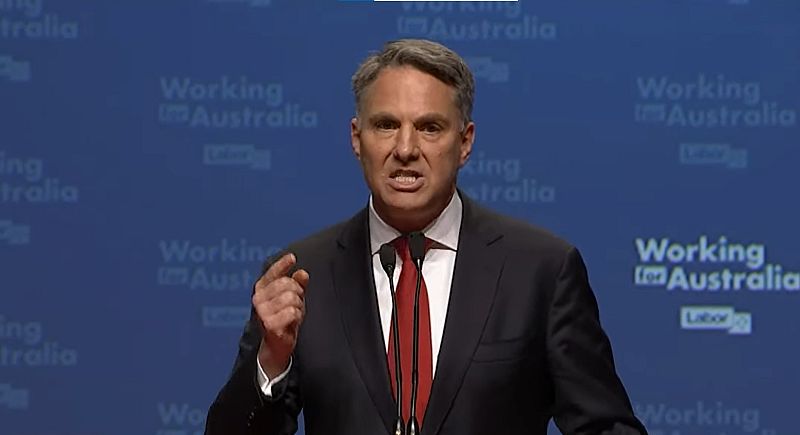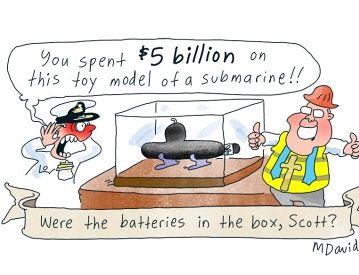The ALP National Conference aimed to sideline, at least for a time, any internal opposition to its war-mongering policies.
While the parliamentary branch got their way, the anti-AUKUS movement within the ALP will not go away nor will the growing opposition in Australian society to the developing war economy or our government’s obsequious attachment to U.S. foreign policy.
The behaviour of the leadership of the ALP was insulting to its membership. When Defence Industry Minister Pat Conroy described those who oppose AUKUS as an equivalent to pre-WWII "appeasers" and akin to those who backed Robert Menzies at the time, it was clear just where the Albanese Government lined up and where they are headed.
Conroy attacked the unions who stand against the militarisation of our economy. His remark, that it was not in Australia’s national interest to have "one power dominate our region, especially one that breaches international laws" was illuminating. The reference was to China but it is the USA that dominates our region. It is the USA that has a record of overturning legal sovereign states time and time again.
Conroy’s diatribe went even further.
He said:
"If you’re pro-human rights, you need to be pro-AUKUS. If you’re pro-peace, you need to be pro-AUKUS. If you’re pro-advanced manufacturing, you need to be pro-AUKUS."
Exit logic, enter the irrational. In this fantasy world, to militarise the region, to threaten war, to arm for war, to destroy an economy for war is to be pro-human rights, pro-peace and pro-jobs.
The Prime Minister lauded the submarines as a job creation scheme. This was meant to placate the union delegates. $360 billion to produce 20,000 jobs is an insult to anyone’s intelligence. We daily live with a health and housing crisis of gigantic proportions. How many affordable homes, schools, hospitals, climate change mitigation actions would $360 billion buy? How many tens of thousands of socially useful jobs might be created? We will, instead, get a war-based economy that will endanger us all, both in this country and the broader region.
In the lead-up to the conference came the revelation that a new U.S. Air Force "mission planning" and operations centre will be built in Darwin, as part of $630 million in American spending in northern Australia over the next two to three years. The obvious conclusion that can be drawn from this decision is that Australia will be even more closely locked into a future conflict between the USA and China.
Logic and good sense tell us that this is just one more disturbing piece of a dangerous puzzle that is leading us into a war that serves no one’s interests. That, however, is not how the hawks at Strategic Analysis Australia are seeing things. Michael Shoebridge, director of this think-tank, believes that ‘the scale and speed of the U.S. investment in Australia shows they understand the need for urgency, but unfortunately we don't seem to… This is about deterring a conflict and the best way to do that is through collective military power'.
The assumption that a conflict is all but inevitable and that "deterrence" can only be achieved by belligerence is a strategy that will lead us all into very dangerous waters.
A recent spat between "analysts" has been spicing up the pages of the Australian Strategic Policy Institute’s commentary site, The Strategist. An essay by Sam Roggaveen in the journal Australian Foreign Affairs argues that ‘Australia’s single biggest defence asset is distance'.
Roggaveen is by no means advocating a peace policy or admitting that China is not a threat. Even so, he has drawn the ire of Paul Dibb, emeritus professor of strategic studies at the Australian National University.
Dibb writes that:
‘Attacking China’s military bases in the South China Sea and contingently in the South Pacific certainly should be included in our future targeting doctrine.’
We have reached a sorry state when such a premise can be accepted and yet this is the state that the debate has reached. Much of the Dibb criticism revolves around the concept of deterrence theory and the two alternatives; deterrence by punishment and destruction or denial where an adversary is held at bay by a "forward-based defence strategy".
All of this is reflected in ALP policy and supported by all conservative forces in Australia.
The willful blindness to see an alternative leads Dibb to make the claim that:
‘The main problem with Roggeveen’s article is that he focuses entirely on the dangers of resisting and deterring China without comparing that approach with the dangers of not resisting and not deterring China. That is not a prudent approach to making Australia’s security policy.'
Only a few very short years ago, analysts, policy advisors, governments and the media were a little more circumspect. A degree of coyness existed. China was being prepared as a suitable enemy but never mentioned by name. Today the gloves are off. It is as though the war was upon us.
The USA has deemed that China must be "contained" and reduced. The fear that the USA has is either that China is a rising capitalist power that will soon eclipse U.S. power, or that China is a socialist state that is building an economic base that might eclipse, socially as well as economically, the power and prestige of the USA.
To maintain that prestige and power the United States is prepared to push the world to the brink and beyond. Australia has let it be known that regardless of the fiction of a China threat, and regardless of the fact that our interests are better served by working with China and not against it, the American alliance is what matters most.
The ALP National Conference has sent a message to China, to the Australian people and most importantly to the USA, that China is now an accepted enemy and that war is an acceptable option. Meanwhile, homelessness grows, health outcomes deteriorate, incomes shrink and inequality increases. War preparations grow, money is wasted, and an enemy has been created and demonised.
Dr William Briggs is a political economist. His special areas of interest lie in political theory and international political economy. He has been, variously, a teacher, journalist and political activist.
Related Articles
- U.S. grip over Australia strips us of sovereignty
- Fractures within the newly formed AUKUS 'alliance'
- AUKUS deal shows Australia's subservience to U.S. dictates
- $368 billion leagues under the sea: The Opportunity Cost of staying afloat
- $368 billion leagues under the sea: The Opportunity Cost of staying afloat
 This work is licensed under a Creative Commons Attribution-NonCommercial-NoDerivs 3.0 Australia License
This work is licensed under a Creative Commons Attribution-NonCommercial-NoDerivs 3.0 Australia License
Support independent journalism Subscribe to IA.














